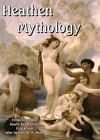|
Lost History
Ancient History
|
Bestsellers
Ancient History
Products
- per page
It is a common opinion, that there are some doctrines so sacred, and others of so bad a tendency, that no public discussion of them ought to be allowed. Were this a right opinion, all the persecution that has ever been practised would be justified
From 1900 this book reads like a tourist guide to the lost city of Pompei. Lots of interesting tidbits not always found in newer works.
I have frequently been asked, "Why do you take an interest in gypsies?" And it is not so easy to answer. Why, indeed? In Spain one who has been fascinated by them is called one of the aficion, or affection, or "fancy;" he is an aficionado, or affected unto them, and people there know perfectly what it means, for every Spaniard is at heart a Bohemian. 2 BOOKS in 1 VOLUME!
This work contains a collection of the customs, usages, and ceremonies current among gypsies, as regards fortune-telling, witch-doctoring, love-philtering, and other sorcery, illustrated by many anecdotes and instances, taken either from works as yet very little known to the English reader or from personal experiences.
There are a handful of people whose research over the years into the world of the esoteric has enriched our knowledge of the mysteries of this world and the next. One of these researchers, Charles Godfrey Leland, contributed so much to our present day understanding of magick and the people who practice it, that it is both mystifying and heartbreaking that little is remembered or attributed to this amazing man.
There was something very pleasing and very poetical in the thought, that each river had its nymph, and every wood its god: that a visible power watched over even the domestic duties of the people, ready to punish or reward; and that, too in a manner so strange and immediate, that it must have greatly affected their minds in stimulating to good, or deterring from evil.
The relationship between the Egyptian and the Hebrew becomes even closer as the author exposes the origins of the Aleph-Bet.
Secret Lineage of the Patriarch Joseph : When Joseph revealed his identity to his kinsmen who had sold him into slavery, he told them that God had made him "a father to Pharaoh." Throughout the long history of ancient Egypt, only one man is known to have been given the title "a father to Pharaoh" --- Yuya, a vizier of the Eighteenth Dynasty king Tuthmosis IV. Yuya has long intrigued Egyptologists because he was buried in the Valley of Kings even though he was not a member of the Royal House.
Few Christians, even fewer theologians, know that the religion of the Hebrews was greatly different than Judaism that we know today. Judaism was established after the release of the Jews from Babylonian/Persian captivity. It is a variant and conglomeration of the old Hebrew religion and the Persian/King Cyrus religion to the god Marduke.
A curious little book fronm 1729 expounding on the sins of London.
St. Paphnutius used to tell a story which may serve as a fit introduction to this book. It contains a miniature sketch, not only of the social state of Egypt, but of the whole Roman Empire, and of the causes which led to the famous monastic movement in the beginning of the fifth century after Christ.
It is, of course, no easy task to infuse a spirit of originality into matter which has already achieved such a measure of celebrity as have these wild and wondrous tales of Rhineland. But it is hoped that the treatment to which these stories have been subjected is not without a novelty of its own. One circumstance may be alluded to as characteristic of the manner of their treatment in this work. In most English books on Rhine legend the tales themselves are presented in a form so brief, succinct, and uninspiring as to rob them entirely of that mysterious glamour lacking which they become mere material by which to add to and illustrate the guide-book.
Men's conceptions of the heroic change with changing years, and vary with each individual mind; hence it often happens that one person sees in a legend only the central heroism, while another sees only the inartistic details of medi
The little tales which follow, drawn from the most striking and picturesque of the Northern myths, are put together in the simplest possible form, and were written only with a design to make the subject interesting to children. By-and-bye, however, as we through their means become in a slight degree acquainted with the characters belonging to, and the parts played by, the various deities of this mythology, it will not be uninteresting to consider what their meaning may be, and to try if we can trace the connection of one with another.
IF deeper pitfalls are laid by anything more than by the facts of coincidence, it is perhaps by the intimations and suggestions of writings which bear, or are held to bear, on their surface the seals of allegory and, still more, of dual allusion; as in the cases of coincidence, so in these, it is necessary for the historical student to stand zealously on his guard and not to acknowledge second meaning or claims implied, however plausible, unless they are controlled and strengthened by independent evidence.
- per page




























